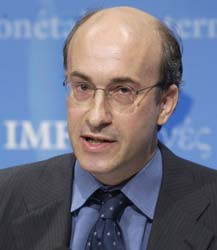|
Mumbai: A large US bank is expected to fail in the next few months as the worst of the global financial crisis unfolds, pushing the world's biggest economy deeper into a financial mess, former IMF chief economist and economics professor at Harvard University Kenneth Rogoff said.  ''We're not just going to see mid-sized banks go under in the next few months, we're going to see a whopper, we're going to see a big one, one of the big investment banks or big banks,'' said Rogoff. ''We're not just going to see mid-sized banks go under in the next few months, we're going to see a whopper, we're going to see a big one, one of the big investment banks or big banks,'' said Rogoff.
''I think the financial crisis is at the halfway point, perhaps,'' said Rogoff who was the International Monetary Fund's chief economist from 2001 to 2004, adding, perhaps ''the worst is to come.'' ''We have to see more consolidation in the financial sector before this is over," he said. He said despite US treasury secretary Hank Paulson's statements on US mortgage giants Fannie Mae and Freddie Mac ''these agencies are not going to exist in their present form in a few years.'' Investors have dumped shares of Fannie Mae and Freddie Mac on Monday after newspaper reports said that government may have no choice but to nationalise the housing finance firms. Injection of fresh capital into the two companies would, however, wipe out existing common stock holders. Preferred shareholders and even holders government-sponsored entities' $19 billion of subordinated debt would also suffer losses, reports said. The huge banking sector investments in the US by sovereign wealth funds from Asia and the Middle East may not necessarily result in large profits, Rogoff said, adding the investors might have failed to take into account the broader market conditions. Sovereign wealth funds from Singapore, GIC and Temasek, have invested billions in Merrill Lynch and Citigroup. The US Federal Reserve also reduced interest rates by a nearly 3.25 percentage points to two per cent since mid-September to help the bail-out.
|